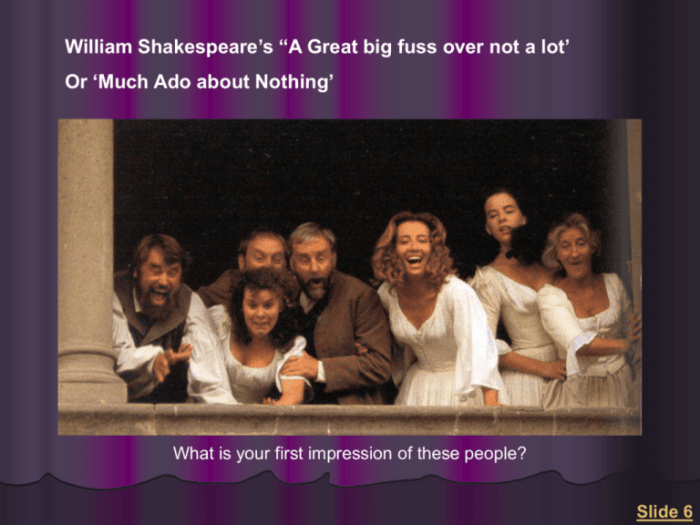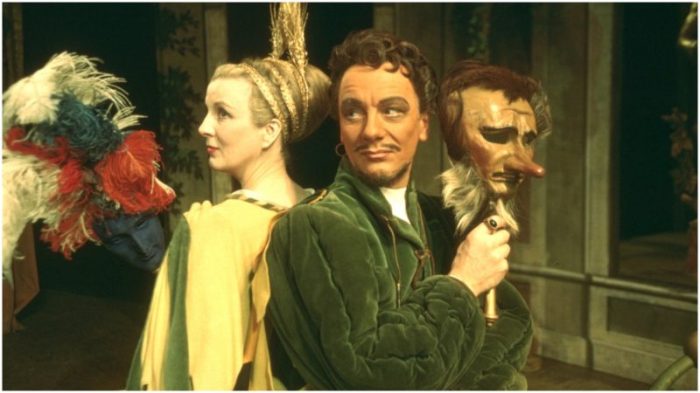Puns in Much Ado About Nothing set the stage for this enthralling narrative, offering readers a glimpse into a story that is rich in detail and brimming with originality from the outset. The clever use of wordplay throughout the play adds layers of humor, character development, and plot advancement, making it a captivating read for audiences of all ages.
William Shakespeare’s Much Ado About Nothing is a delightful comedy filled with mistaken identities, witty banter, and romantic entanglements. One of the most striking features of the play is its extensive use of puns, which contribute significantly to its humor and characterization.
Wordplay in the Play

William Shakespeare’s “Much Ado About Nothing” is renowned for its witty and intricate wordplay, which serves as a cornerstone of the play’s humor, character development, and thematic exploration.
Shakespeare employs various types of wordplay in the play, including puns, malapropisms, and double entendres. These devices create layers of meaning, allowing for multiple interpretations and enhancing the play’s comedic and dramatic impact.
Puns
Puns, a form of wordplay that exploits the multiple meanings of words or phrases, are prevalent throughout “Much Ado About Nothing.” For instance, when Benedick declares, “I do love nothing in the world so well as you,” he simultaneously expresses his affection for Beatrice and his disdain for love itself.
Malapropisms
Malapropisms, the humorous misuse of words, also contribute to the play’s wordplay. Dogberry, the incompetent constable, frequently mispronounces words, creating unintended humor. For example, when he refers to “comparisons” as “comparisons,” he unwittingly highlights the absurdity of his own speech.
Double Entendres
Double entendres, words or phrases with two meanings, one of which is often sexual, are another form of wordplay used in the play. For instance, when Beatrice tells Benedick, “I will even eat his heart,” she simultaneously refers to her desire to consume his love and her willingness to engage in a romantic relationship with him.
Significance of Wordplay
The wordplay in “Much Ado About Nothing” serves several significant functions. It adds humor to the play, creating a lighthearted and entertaining atmosphere. It also reveals the characters’ personalities, highlighting their wit, intelligence, and comedic timing. Moreover, the wordplay contributes to the play’s themes of love, marriage, and deception, adding depth and complexity to the narrative.
Puns and Characterization

Puns are a prominent feature in Much Ado About Nothing, employed by various characters to reveal their personalities, motivations, and relationships. The frequent use of puns adds a layer of humor and wit to the play, contributing to its comedic tone.
Beatrice and Benedick’s witty banter in Much Ado About Nothing is a prime example of how puns can add humor and depth to a conversation. Speaking of depth, have you ever wondered about the role of luxury goods in shaping world history? From ancient Egypt to the modern era, luxury goods have played a significant role in shaping societies and economies.
You can learn more about this fascinating topic at luxury goods ap world history . Returning to our puns, Beatrice and Benedick’s wordplay not only entertains but also reveals their underlying feelings and motivations, making their relationship all the more complex and enjoyable.
The character who uses puns most frequently is Benedick, a witty and sarcastic nobleman. His puns often reflect his sharp intellect and disdain for love. For example, when Beatrice accuses him of being a “contemptuous spirit,” he retorts, “I would he had boarded me in the cold night for a fish of such a perfumed favor.”
This pun not only demonstrates Benedick’s quick wit but also reveals his underlying bitterness towards Beatrice.
Beatrice’s Use of Puns
Beatrice, Benedick’s counterpart, also employs puns to express her intelligence and independence. Her puns often serve as a defense mechanism against her own vulnerability. For instance, when Benedick asks her if she loves him, she replies, “I love you with so much of my heart that none is left to protest.”
This pun allows Beatrice to express her feelings while maintaining her pride.
Puns in Building Relationships, Puns in much ado about nothing
Puns also play a role in building relationships between characters. The shared appreciation of puns creates a sense of camaraderie and intimacy. For example, Benedick and Beatrice’s witty banter through puns initially masks their mutual attraction. However, as they continue to exchange puns, they gradually reveal their true feelings for each other.
Humor and Wordplay
The use of puns in Much Ado About Nothing not only contributes to characterization but also adds humor to the play. The unexpected twists and turns of language create a comedic effect that lightens the play’s more serious moments. For instance, when Dogberry, the incompetent constable, attempts to explain his reasoning, he says, “Comparisons are odorous.”
This nonsensical statement elicits laughter from the audience while highlighting Dogberry’s lack of intelligence.
Puns and Plot Development

Puns in Much Ado About Nothing play a significant role in advancing the plot and shaping the characters’ actions. Shakespeare employs puns to foreshadow events, reveal crucial information, and create dramatic irony and suspense.
Puns as Foreshadowing
Shakespeare uses puns to subtly hint at future events or character motivations. For example, in Act II, Scene I, Benedick puns on the word “diet” when he says, “I have the toothache.” This seemingly innocuous joke foreshadows the “toothache” of love that Benedick will experience when he falls for Beatrice.
Puns as Information Revealers
Puns can also serve to subtly reveal important information about the characters or the plot. In Act III, Scene IV, Dogberry’s malapropisms and puns expose the incompetence of the Watch and foreshadow their failure to apprehend the villains.
Puns for Dramatic Irony and Suspense
Shakespeare uses puns to create dramatic irony and suspense by making the audience aware of information that the characters do not know. For instance, in Act IV, Scene I, Claudio believes Hero to be unfaithful, but the audience knows that she is innocent.
The puns and wordplay in this scene highlight the dramatic irony and create suspense as the audience anticipates the resolution.
Cultural Context of Puns: Puns In Much Ado About Nothing

Puns were a prevalent and cherished form of wordplay in Elizabethan England. They were not merely linguistic curiosities but held significant cultural and social implications, deeply embedded in the literary and entertainment landscape of the era.
During the Elizabethan period, puns were employed extensively in various literary genres, including plays, poetry, and prose. William Shakespeare, renowned for his mastery of language, frequently incorporated puns into his works, using them to create humor, emphasize themes, and enhance characterization.
Other notable playwrights of the time, such as Ben Jonson and Christopher Marlowe, also utilized puns in their plays.
Social Significance
Puns played a crucial social role in Elizabethan society. They were not confined to the realm of literature but were actively used in everyday speech and conversation. Puns were a means of displaying wit, intelligence, and social adeptness. Individuals who could skillfully craft and appreciate puns were highly regarded and admired.
Furthermore, puns served as a form of social commentary. By cleverly juxtaposing words with multiple meanings, playwrights and other entertainers could subtly criticize or satirize societal norms, political figures, and contemporary events.
In summary, puns were an integral part of Elizabethan culture, reflecting the era’s fascination with language, wit, and social commentary. They were not mere linguistic tricks but held significant cultural and social value, enriching the literary landscape and shaping the social interactions of the time.
Answers to Common Questions
What is the significance of puns in Much Ado About Nothing?
Puns contribute to the play’s humor, character development, and plot advancement.
Who uses puns most frequently in the play?
Benedick and Beatrice are the characters who use puns most frequently.
How do puns reveal the characters’ personalities?
Puns reveal the characters’ wit, intelligence, and romantic tension.
What is the historical and cultural context of puns in Elizabethan England?
Puns were a popular form of entertainment in Elizabethan England and were used in various literary works and forms of entertainment.
